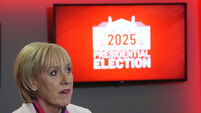Paisley — a destructive demagogue who prolonged the North’s agony
The Taoiseach’s claim that Paisley was a “giant” of Irish history who had “sincerely done what he believed was right“ was widely rubbished in most newspapers on Sunday. In the Sunday Independent, Eilís O’Hanlon highlighted the ultimate irony- that “for almost his entire life, Paisley was a vile caricature of a man of God whose contribution to life in Northern Ireland was overwhelmingly negative”.
Eoghan Harris, meanwhile, drew attention to the fact that Paisley spent his career destroying any leader of unionism who was prepared to contemplate compromise and change and “delayed peace by possibly 20 years”.
Nonetheless, there was evidence in the Sunday Tribune that Paisley’s occasional charm offensives did change people’s minds about him. The paper’s northern editor, Suzanne Breen, recalled her first encounter with Paisley when he glared and roared at her as a “journalist from a Dublin newspaper… here to write propaganda for the enemies of Ulster”, but then broke into loud guffaws of laughter, extended his hand, and there followed “14 years of craic and confidences”.
Breen, like many others, disagreed with the actions and rhetoric of Paisley over the years but also found him straight and honest, charismatic and never sectarian “on a personal level”.
I wasn’t surprised that Breen was more positive in her assessment than others. Last year I chaired a radio discussion with her and Deaglán de Breadún of the Irish Times. It was quite clear she had fallen for Paisley and was at pains to emphasise his sense of humour and the fact that he could laugh at himself.
De Breadún was unimpressed with the Paisley charm because he had seen him preach behind closed doors and was disgusted with what he heard and the level of hatred that inspired his rhetoric. That radio discussion had raised the question of whether it would have made a difference if Paisley had stuck to religion instead of politics.
This question was prompted by a newspaper cutting from 1974 that I found in the National Archives a few years ago. It reported that Paisley was contemplating emigration to Canada to set up a branch of his church there. It is a pity he did not because, as Eoghan Harris recognises, the history of Northern Ireland could indeed have been different and less bloody if Paisley had departed the stage. Like many others, I was convinced, almost exactly 10 years ago, that Paisley was finished and that a new generation of unionists would put the final nails in his coffin by working the Good Friday Agreement and marginalising the extremists in the DUP. What we underestimated was Paisley’s addiction to exploiting the tensions within unionism for his own gratification.
Maurice Morrow, chairman of the DUP, was in Dublin on Monday night as a panellist on RTE’s Question and Answers. He was asked how history will remember Paisley. He trotted out a familiar DUP script that Paisley “has been the one leader who stood up for unionism... in the mould of Carson and Craigavon”, and that “he’s walking off the scene when he’s on top”.
It is not true that history will remember him as the only leader who stood up for unionism — history will remember him as a destructive, divisive, character who, with extremists on the republican side, prolonged the agony in Northern Ireland until his very late ‘conversion’.
The DUP was always ironically named because, in reality, it has been a dictatorship for more than 35 years and has contributed much to the immaturity and corruption of the political culture of unionism.
Why has there been so little comment south of the border about the blatant jobbery and lack of ethics that sees DUP princes feather their own nests with sweet deals and jobs for family members?
Why has there been little comment on the misogyny that the DUP fostered in Northern Ireland politics and society?
The spin about Paisley wanting to be married to an independent woman obscured the fact that throughout his career, he was uncomfortable with strong-minded women and did his utmost to denigrate them.
Unionists don’t demand a complex vision of their own complicated past and are generally dismissive of historians or journalists who attempt to analyse them. Ed Moloney’s updated biography of Paisley (first published in 1986 when it was co-authored with Andy Pollak) does, however, succeed in getting to the heart of Paisleyism, and rarely has a biography been so timely.
Paisley and his son, of course, refused to talk to Moloney and the DUP members and Free Presbyterians who did talk to him “must remain unnamed for their own good and safety”, which gives some indication of the way the dictatorship in the DUP has worked.
Despite the understandable focus on the last few years and the extraordinary last chapter in Paisley’s political career, what is valuable about Moloney’s book is the attention devoted to Paisley 50 years ago. What emerges is the degree to which forcing confrontation was, for over 50 years, central to the Paisley project.
That there would be no divide between religion and politics was evident as early as 1946 when, in the words of Moloney, “it took Paisley little more than a month to translate his new religious status into political involvement” with the evangelical extremism of the National Union of Protestants. The determination to take advantage of divisions also prompted him to exacerbate splits over theology in the Presbyterian Church in the early 1950s in order to grow his Free Presbyterian flock.
MOLONEY quotes one contemporary observer: “It looked as if he wanted to build up a congregation, and it didn’t matter what price or what issue”. That was the pattern he repeated over the next 50 years, in politics and religion, and there was a high price to be paid by others.
There was also a blatant encouragement of sectarian violence.
As Susan McKay pointed out, it has been well said of him that he was always willing to fight to the last drop of everyone else’s blood.
He also used vulnerable people to generate publicity to satisfy his enormous ego and he was determined to build a cult around his personality regardless of the damage he did in the process. It has been a life spent destroying other lives and careers in order to further his own ambitions.
Moloney is surely correct that even the late “conversion” to the principle of power-sharing was more about Paisley giving two fingers to all his enemies within Northern Ireland, a reminder that unionism has always been fractured, hence the overriding aim of Paisley to dominate others within the unionist community.
History will not be kind to Paisley and the biggest irony is that while he spent his entire career building support for himself by accusing others of abandoning principles, he had few, if any, of his own.
A Paisley who genuinely wanted to embrace reconciliation would have supported the courageous strategy of David Trimble 10 years ago.





